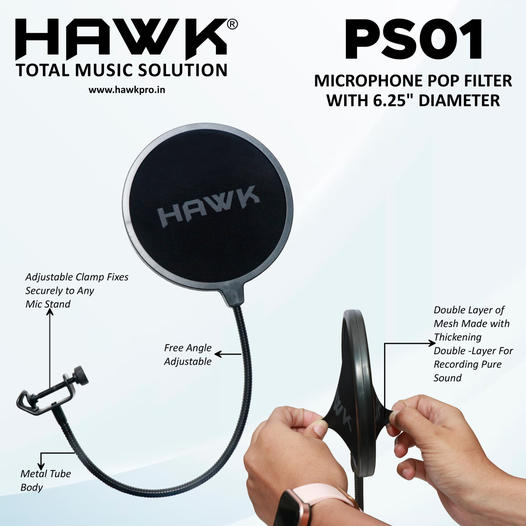The Ultimate Guide to Pop Filters: Why They’re Essential for Your Recording Setup

If you’re delving into the world of audio recording, whether for podcasts, music, or voiceovers, you’ve likely encountered the term “pop filter.” But what exactly is a pop filter, and why is it such an essential component of your recording setup? In this blog post, we’ll explore everything you need to know about pop filters, from their purpose and benefits to how to choose the right one for your needs.
What is a Pop Filter?
A pop filter, also known as a pop shield or pop screen, is a device used in recording studios to reduce or eliminate popping noises caused by plosive consonants. Plosives are explosive bursts of air that occur when pronouncing certain sounds, such as “p,” “b,” and “t.” These bursts can create unwanted distortion in your recordings, leading to a less professional sound.
How Does a Pop Filter Work?
A pop filter typically consists of a thin mesh or fabric stretched over a circular frame. This filter is placed between the microphone and the speaker’s mouth. When the speaker produces plosive sounds, the filter disperses the airflow before it reaches the microphone, thereby reducing the impact of the burst and preventing distortion.
The Two Main Types of Pop Filters:
- Metal Pop Filters: Made from a fine metal mesh, these filters are durable and easy to clean. They often provide a clearer sound by allowing for better airflow and reducing resonance. However, they can be slightly more expensive than their fabric counterparts.
- Fabric Pop Filters: Usually made from nylon or another synthetic material, these filters are more affordable and often have a softer sound quality. They can be less durable and may need replacement over time, but they are still highly effective at reducing plosives.
Benefits of Using a Pop Filter
- Improved Audio Quality: By reducing plosives, a pop filter helps ensure that your recordings are clean and professional-sounding. This is particularly important for vocal recordings where clarity and precision are crucial.
- Less Post-Production Work: Without a pop filter, you might need to spend extra time in post-production editing to remove unwanted plosive sounds. A pop filter can save you time and effort by minimizing these issues during recording.
- Protects Your Microphone: Pop filters can also help protect your microphone from saliva and other debris that might be expelled during vocal recordings. This can prolong the life of your equipment and keep it in better condition.
- Versatility: Pop filters are not only useful for vocals but can also be beneficial for other recording applications, such as voiceovers or acoustic instruments. They help maintain a clean sound across various types of recordings.
Choosing the Right Pop Filter
When selecting a pop filter, consider the following factors:
- Material: Decide whether you prefer a metal or fabric filter based on your budget and sound preferences. Metal filters tend to last longer and offer better airflow, while fabric filters are often more affordable.
- Size and Design: Make sure the pop filter is large enough to cover the microphone properly and that its design fits well with your recording setup. Some pop filters come with adjustable mounts or flexible arms for easier positioning.
- Compatibility: Ensure that the pop filter is compatible with your microphone setup. Most filters are designed to fit standard microphone stands, but it’s always good to double-check.
Setting Up and Using a Pop Filter
To use a pop filter, position it a few inches in front of the microphone. The exact distance can vary depending on the filter and your recording setup, but a good rule of thumb is to place it about 2-4 inches from the mic. This allows the filter to effectively diffuse plosives without interfering with the microphone’s ability to capture the vocal performance.
Conclusion
A pop filter may seem like a small and simple accessory, but its impact on the quality of your recordings can be significant. By reducing plosive sounds and protecting your microphone, a pop filter helps you achieve clearer, more professional audio. Whether you’re recording vocals, podcasts, or voiceovers, investing in a pop filter is a smart decision that can enhance your overall sound quality and make your recording process smoother and more efficient.
